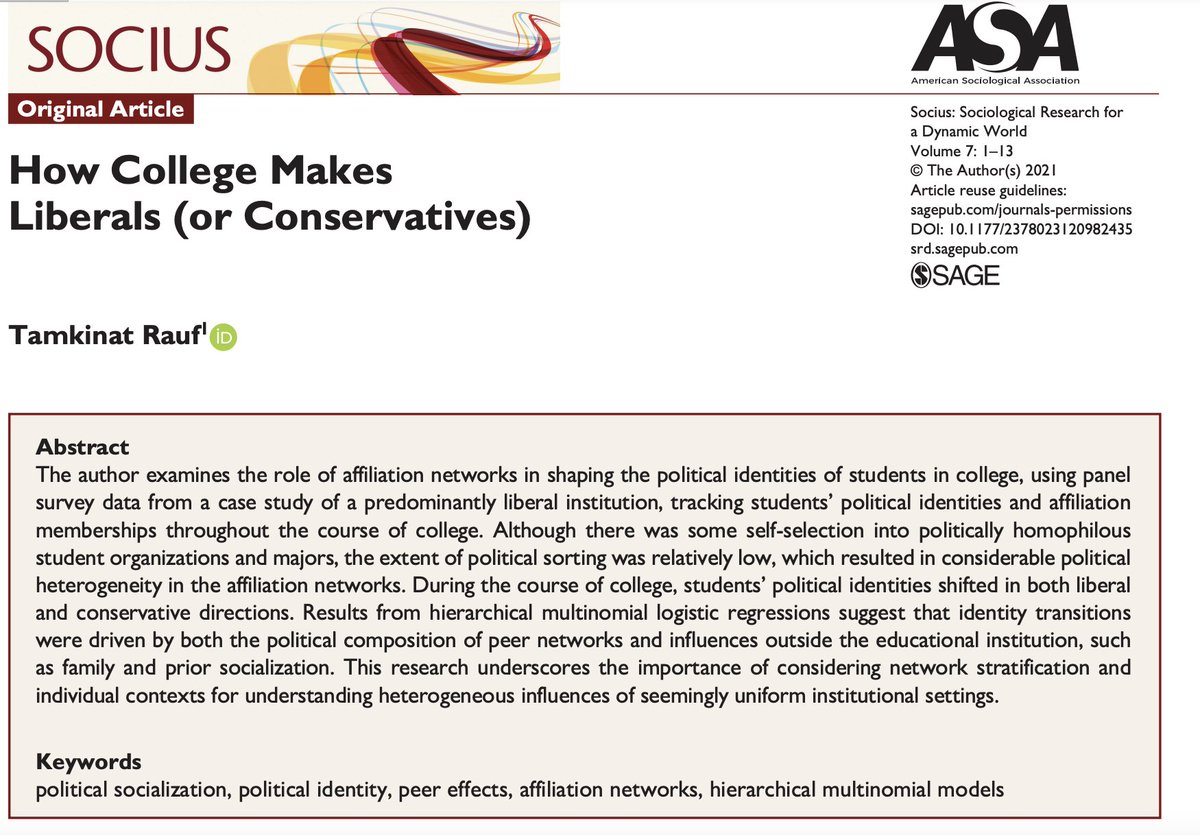As promised to @Noahpinion, I'm going to run through some of the recent work (2019-present) on the claim that university makes students more liberal and/or that faculty are responsible. I'm focusing on post-2018 because I cover the older research here.
medium.com/arc-digital/no…
medium.com/arc-digital/no…
@Noahpinion For those uninterested in reading it, the gist of the above piece is: a) student ideological ID changes very little; b) attitudes change a bit; and c) what change does occur is due to peers, not profs.
With few exceptions, subsequent research bears that out. Here's a round-up.
With few exceptions, subsequent research bears that out. Here's a round-up.
@Noahpinion Rauf 2021: Network effects rule everything around me. Students rarely change their political ideology in college, but when they do, it is driven by their peer network's diversity (e.g. is it all lib? con?) and density (e.g. how tight knit is it?). 

@Noahpinion Because the school being studied (Stanford) is 7:1 liberal, a more diverse network is associated with a greater likelihood that a student shifts rightward, and vice versa. Interestingly, denser networks also predicted a rightward shift. 



@Noahpinion IOW, it's about peers not profs. Students want to be like their friends and will adjust their ideology accordingly. But bear in mind two things: a) these effects are small; and b) the study shows they are overwhelmed by the influence of parents' ID and high school socialization.
@Noahpinion Strother (2020) looks at roommates and finds the same thing. The neat thing about roommates is that unlike peer groups, students don't pick them, so you've got a nice experiment here. Does an exogenous variable (your roommate's politics) affect your own?
pnas.org/content/pnas/1…
pnas.org/content/pnas/1…

@Noahpinion And the answer is yes! Students placed with a roommate who has a different political ideology shifted *toward* their roommate's ideology by the end of their first year. And here's the kicker: the biggest shifts were rightward. It's libs -> cons, not cons -> libs. 

@Noahpinion I call this the Shapiro Effect. 

@Noahpinion Note that this is about ideology (are you a lib or con?), not student attitudes on issues. That makes sense, since the two typically map onto one another very tightly. Plus, if what you want is to predict voter behavior, ideological ID matters more.
journals.uchicago.edu/doi/full/10.10…
journals.uchicago.edu/doi/full/10.10…
@Noahpinion But DOES university affect students' attitudes on specific issues? Woessner and Kelly-Woessner (2020) find they do, and that they tend to shift leftward as well. The effects, however, are inconsistent across issue type.
cambridge.org/core/services/…
cambridge.org/core/services/…

On gay marriage and abortion, students move leftward. The shift on gay marriage largely tracks broader shifts among all Americans, but on abortion they are outliers (i.e. students moved leftward at a time when public opinion was static). 

Race-related questions were different. There was a shift leftward on support for AA, but changes on whether racism is a problem went in both directions and cancelled each other out. 

Onward! Brocic and Miles (2021) set political issues to one side and focus on moral world views. They track support for two moral attitudes: moral progressivism (definition of right/wrong change over time) and moral absolutism (there is an objective right/wrong). 

Note that these two attitudes are distinct and a person can hold them both simultaneously. Which is precisely what they find, especially among humanities/arts/social sciences (HASS) and grad students. 

In other words, majoring in HASS or being a grad student is associated with believing that a) morality is constantly changing over time; but b) there are objective standards of right and wrong.
Two other effects: students attach a greater value in caring for others and lesser value in the prevailing social order.
Put these shifts together and it lends support to the Haidt/Lukianoff profile of students as leftwing moral puritans.
Put these shifts together and it lends support to the Haidt/Lukianoff profile of students as leftwing moral puritans.

The negative spin on this is that higher ed makes students less morally tolerant. The positive spin is that it gives them moral conviction. How you interpret that will probably depend much on whether you agree with their underlying political beliefs.
Regardless, this finding (like all findings!) comes with limitations and counter-arguments. For instance, Woessner and Maranto (2021) finds that majoring in political science, a classic HASS major, makes students *more supportive* of free speech (e.g. opposition to speaker bans). 



Lastly, I want to rope in a thread I did a while back on the relationship between higher education and anti-Semitism, which obviously I care a lot about for personal reasons. And on this issue, the findings are good.
https://twitter.com/JeffreyASachs/status/1303734352396812291
Put this all together and how should you feel about the Great University Brainwashing Hypothesis? Recall the three findings I described based on pre-2019 research.
https://twitter.com/JeffreyASachs/status/1459252861888602118
a) on whether university changes student political ideology, these results reaffirm it does NOT.
b) on whether it changes students attitudes, they affirm that it CAN.
c) on whether it's peers vs. faculty, the evidence is overwhelming that it is PEERS.
b) on whether it changes students attitudes, they affirm that it CAN.
c) on whether it's peers vs. faculty, the evidence is overwhelming that it is PEERS.
That's it! Happy Shabbat, everyone.
• • •
Missing some Tweet in this thread? You can try to
force a refresh












